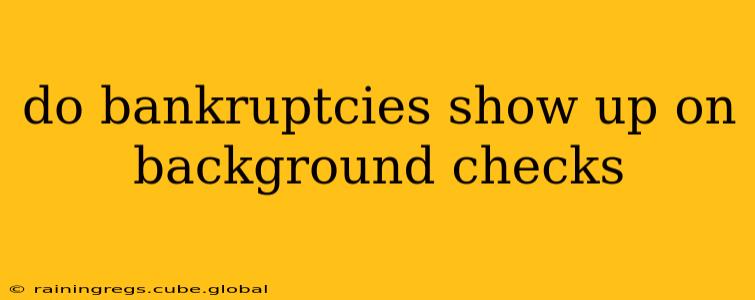Do Bankruptcies Show Up on Background Checks?
The short answer is: it depends. Whether a bankruptcy appears on a background check hinges on several factors, primarily the type of background check conducted and the specific information the employer or other entity is seeking. Let's break it down.
What Kind of Background Check Are We Talking About?
The type of background check significantly impacts what information is revealed. There are various types, each with different scopes and legal limitations:
-
Consumer reports: These are the most common type, often used by employers during the hiring process. These reports typically include credit history, but the inclusion of bankruptcy information is variable. While some consumer reporting agencies may include bankruptcies, others might not, depending on their data sources and the specific report requested. The Fair Credit Reporting Act (FCRA) governs these reports, establishing certain consumer rights and limitations on what can be included.
-
Criminal background checks: These checks focus on criminal history, not financial history. Bankruptcies are civil matters, not criminal offenses, and therefore won't appear in these reports.
-
Employment background checks: These checks verify employment history, education, and references, and typically don't include financial information like bankruptcies.
What Information is Actually Checked?
Even if a consumer report could include bankruptcy information, it depends on what the requesting party is specifically looking for. Employers conducting background checks may be primarily interested in things like criminal history, employment history, and driving records. Financial history, including bankruptcies, may not be relevant to the position.
How Long Does a Bankruptcy Stay on a Background Check?
If a bankruptcy does appear on a consumer report, it typically remains there for seven to ten years from the date of filing. However, this isn't a hard and fast rule. Some reports might show it for longer or shorter periods depending on the reporting agency's policies.
What About Specific Industries?
Certain industries may have stricter requirements, increasing the likelihood of a bankruptcy appearing in a background check. For instance, some financial institutions or government agencies might conduct more comprehensive checks, potentially including bankruptcies.
Can I Dispute Inaccurate Bankruptcy Information?
The FCRA provides individuals with the right to dispute inaccurate information on their credit reports. If you believe a bankruptcy is incorrectly reported on a background check, you should contact the reporting agency and follow their dispute process. This involves providing evidence that the information is inaccurate.
Will a Bankruptcy Always Prevent Me From Getting a Job?
While a bankruptcy appearing on a background check might raise concerns for some employers, it doesn't automatically disqualify you from a job. The impact depends on various factors, including the job's nature, the employer's policies, and your overall qualifications and experience. It is crucial to be upfront and transparent about your financial history and demonstrate your ability to manage your finances responsibly now.
Do landlords check for bankruptcies?
Landlords frequently conduct credit checks as part of the tenant screening process. While the specific information included varies, a bankruptcy could negatively impact your chances of getting an apartment, but it’s not an automatic disqualification. A strong rental history, stable income, and a well-written application letter can help offset concerns.
In conclusion, whether a bankruptcy shows up on a background check is complex and depends on many factors. While not always included, it's prudent to be aware of the possibility and prepared to address any concerns an employer or landlord may have. Transparency and highlighting your financial recovery are key to mitigating potential negative impacts.
